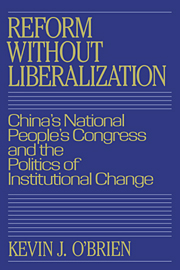 Reform without Liberalization
Reform without Liberalization 2 - Origins of the NPC
Published online by Cambridge University Press: 22 March 2010
Summary
In China, the first half of the twentieth century was a time of ideological and institutional reorientation. Though often remembered for decay and disarray, this period was also one of ferment and soul searching. Amid a debilitating crisis, elites and candidate elites began to question political truths and to promote unconventional strategies to enhance national power, popularize autocratic rule, and achieve control over local society. Intellectuals, officials, and revolutionaries all acknowledged that past attempts to cope with foreign incursions and domestic fragmentation had failed, and they sought new means to reinvigorate the Chinese state and to reassert China's position in the world.
If crisis posed the challenge, aspiring state builders shaped the nation's response. By 1949 the critical pass had been negotiated. Wholesale transformation of the mode of governing established institutional forms, powers, and precedents that reduced the incongruence between the state structure and the domestic and international environment. China's Communist leaders rewrote the compact between state and society, successfully reversing the flow of power into local and foreign hands and reconstituting the political center.
But the process of reintegration and rebuilding was neither smooth nor incremental: it was fitful, full of false starts and contradictory impulses. Beginning early in the century, rival state builders turned to liberal democracy, authoritarian socialism, and traditional Chinese political formulas for guidance; structures and functions cumulated and imperfect solutions to imperfectly understood problems created new problems, propensities, and approaches to try (and to avoid).
- Type
- Chapter
- Information
- Reform without LiberalizationChina's National People's Congress and the Politics of Institutional Change, pp. 12 - 26Publisher: Cambridge University PressPrint publication year: 1990


